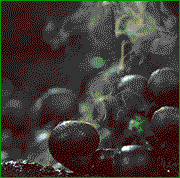|
Melicious posted:This is the guide I’ve used in the past, though I’ve been reading about some folks adding vinegar to bring the cakes’ PH closer to that of honey. That's the one I remember, and somehow couldn't find in Google. Thank you very much!!!
|
|
|
|

|
| # ? May 31, 2024 03:00 |
|
I think Indian summer hosed me over. Last week it dipped below 0 and stayed below freezing for a couple days. After it eased up a bit afterwards I saw bees slowly coming out, likely to poop. That made me happy. The entrances were closed down quite a bit and all was well. The hives, one layens and one warre seemed healthy, and I felt good going into the winter season. HOWEVER... The last couple days it has gotten above 50F. Today I went out and noticed right off that there was steady traffic from one to the other, rather than the normal zig zags in front of each. Could smell the hives and the layens entrance had little dark stains around the entrance, with a small pile of bees below. The warre had what appeared to have cap wax debris on the robbing screen edge. gently caress me Decided now that it is dark to close up both hives entrances and let them chill for at least a day. With the hopes that one if not both retained enough bees and their queens. It is going to be above 60 by this weekend. Here I was dreading winter, when I should have been dreading a sudden warmup. This is my first year handling more than 1 hive. My first thought was “well, if one hive is demolished, the invaders will be stronger”, but I honestly could not determine which of the two was being robbed or if both were. How do you multi hive folks manage this? I imagined there would be some drift, but sudden robbing of each other would take some stimuli like spilled honey or something, not just sudden warm weather. Hasselblad fucked around with this message at 03:44 on Nov 6, 2019 |
|
|
|
I luckily haven't had robbery between my hives (that I witnessed, but I also never saw anything under the hives that would indicate it). I had a weak split robbed once from other bees nearby. I closed the entrance so basically only a single bee can fit through, and the robbery stopped about half an hour later/the robbing bees left. They still managed to rip open (and clear) most of the food and honey combs. If that happens, and the honey can drip through the open floor, it's quite like in this time of year that other colonies nearby start to pay them a visit, too, and overall robbery breaks out. The split I mentioned sat on my balcony at home, so luckily there were no other colonies next to it. We have the same problem in regard to weather...it's pretty warm, and basically all of my hives are breeding like mad, and thus also using winter food like mad (and increasing the little varroa population that was left). I have a really bad feeling about this winter :/ Three hives are already pretty light on the scale, and since the weather forecast seems to stay the same, I think I'll pack some more food onto them this weekend. All the beekeepers here are super nervous, even the ones with dozens of years of experience. Plus, the asian hornet showed up here (I already got a sting from it....absolutely brutal, I haven't had such a pain ever from a stinger), and seems to wreak havoc two towns from here, decimating colonies left and right. What a wonderful time to keep bees :/
|
|
|
|
I have been alternating the hive access the past couple days (and will continue to do so until it cools down). I had them both closed the night I noticed the activity. Next morning I opened just the Warre, and they stampeded (made a bee line) for the Layens. They clustered around the (blocked) Layens entrance as were nibbling at the residue around it. Today I have the Layens open and am waiting for it to warm up to see how active they are. The pile of dead bees outside the Layens was only 50-100 bees. Not as wholesale death as I expected, unless there are piles inside the hives. After such damage, are bees pretty good at putting things back aright as far as recapping and cleaning up the spilled honey? A couple months ago there was a severe cross-comb mess that I removed and separated/jarred. Wondering if there is any point to somehow feeding some of it back to the layens hive. I am hesitant to spark too much laying, that is if the queen(s) are still alive. And I certainly do not want to fully open the hive to do an in-depth inspection. Licking their wounds and getting settled for the winter is what I want their efforts focused on. Google kind of sucks on this subject. I can find an avalanche of articles on how to identify, prevent, and battle robbing, but nothing on what to do for the hive AFTERWARD. edit: If I do not see activity in and about the Layens, I am wondering if it would be best to simply open up the Layens and allow them to finish the job. At least that would help ensure their winter stores. Hasselblad fucked around with this message at 18:49 on Nov 7, 2019 |
|
|
|
Welp. Opened up the Layens (it is now 55F and sunny. Very few bees in the hive, and all were warm-dead. Almost as though they suddenly all died while doing what they do. Even found the queen. Surrounded by attendants, but like the others, quite sans mortal coil.  There were a couple untouched frames of honey, which I removed, saving one comb on the frame for spring when I will put in a new nuc/package. The bulk of the rest of frames were vacant brood cells with very little honey stored on the edges*. 3 frames of robbed comb that were sucked nearly dry of honey. A couple frames with empty cells save for about half with pollen stores. After removing the comb honey from the ones I will crush/strain I put them with their residual honey back into the Layens, then opened it fully, and then opened up the Warre. The Warre population is making a massive mad dash now. Thinking ahead to spring: The Warre should have cleaned out the Layens quite well, while leaving comb for the spring package to utilize. *The oddity is the empty brood cells but no honey in them. That and the very few (maybe a hundred?) remaining dead bees has me wondering. Queen stopped laying? Wasps killed too many of the hive to allow it to prosper? No signs of varroa mites that I could see. Nothing else seemed very amiss. Just really low population and then sudden die off. Fake edit: At first I thought the queen and surrounding bee blob were simply cold, but it was quite above 50F when I opened. Not a single one stirred. On the other hand, the Warre was (and still is) QUITE awake and active. What have I learned from this? Well, the Warre had a diverter screen anti-robbing thingie on it. I had thought the Layens population was holding their own against hornets and such and has a very defensible single opening. So I now know to go the extra mile, regardless of how confident I am. Anti-robbing diverters for all future hives, no question about it. Aside from that, perhaps a incapable queen.
|
|
|
|
That sucks, sorry! I had the same thing happen to me once (completely unprepared, mind you...hive was okay two weeks before, opened it up for winter treatment, bam, dead....aweful feeling :/ ) If you can stomach it, I'd take a look at the remaining and dead bees. Are the abdomen properly developed? Wings okay? No mite on top of them? (won't find them on dead ones, most of the time). I'd also put the remaining, capped brood beside for a short time, until you can make absolutely sure the problem wasn't varroa-induced. If it was, it could happen that the hive was no longer able to produce propper workers (due to mite count), and the remaining, flying bees took what they can get, left, and entered the other hive (in german it's called "kahlfliegen", basically everything that is still able to fly leaves in panic/search of a new home while the original hive collapses). They are accepted by the other hive because they bring food and tell them were's more. Problem is, they also bring the varroa with them. I know it's pretty hard going through dead bees or even pulling out dead, capped brood in search of varroa....but I'd definitely check the mite drop rate of the other hive, to make sure they didn't absorb a maybe unhealthy dose of varroa from the layens hive.
|
|
|
|
tuo posted:If you can stomach it, I'd take a look at the remaining and dead bees. Are the abdomen properly developed? Wings okay? All looked fine. tuo posted:No mite on top of them? (won't find them on dead ones, most of the time). Nope. tuo posted:I'd also put the remaining, capped brood beside for a short time, until you can make absolutely sure the problem wasn't varroa-induced. If it was, it could happen that the hive was no longer able to produce propper workers (due to mite count), and the remaining, flying bees took what they can get, left, and entered the other hive (in german it's called "kahlfliegen", basically everything that is still able to fly leaves in panic/search of a new home while the original hive collapses). They are accepted by the other hive because they bring food and tell them were's more. Problem is, they also bring the varroa with them. There was no capped brood whatsoever. The brood comb were all vacant. tuo posted:
Varroa was actually very light this year in the hives. They were doing great. I think things may have taken a turn as the hornets/wasps began making visits to the hives. They appeared to be holding their own, but I am really kicking myself for not taking the added precaution of a diverter screen on the Layens. I suspect it was a slow prolonged robbing, and then a viscous one once the colony got below a certain count.
|
|
|
|
Hello fellow goons of the bee. Anyone doing solitary bee keeping? I am three seasons into Mason/leafcutters and have a bunch of questions.
|
|
|
|
Regarding the asian hornet: this was found ten kilometres away from me:   If course it was already deserted, experts assume a hive of that size creates around 100 princess hornets, and they assume it creates around 30 to 50 new hives next year. RIP all of my bees 
|
|
|
|
Just came back from winter treatment. All hives still alive, the only one that died was the brood from the total brood removal, but that was to be expected. All hives are sitting on tons of food, and are most of them are sitting on seven frames or more. Only two ones are on the weaker side (four frames). I'm mildly optimistic that I can get all of them over the winter.
|
|
|
|
Should be in the 40s and partly sunny on saturday. I have my fingers crossed that I will see a bit of poo flights.
|
|
|
|
The weather in Chicago has been all over the place. After a BRUTAL November, it actually was in the 60’s last week. I cracked both of my hives open and they looked good, though one was really aggressive and the other super chill. The chill hive also had eaten the entire sugar cake I gave them, so I have no idea if they’ve already eaten all of their honey or are just preferring the sugar, but whatever. Gave them two more cakes. This week has been much colder, but today it’s in the 40s. My infrared camera shows the aggressive hive still clustered in the bottom box, but shrinking. The chill hive has a massive cluster way up top, so I predict I’ll be replacing the sugar cakes pretty quickly. I’m happy both hives are still kicking, but don’t have a ton of hope for the smaller one. Of course, going into the fall, it had been the stronger of the two. Nature is weird. 
|
|
|
|
Weather over here was also all over the place, and basically too warm. All hives bred until mid of november, when finally the temps dropped a bit, so we could do the winter treatment at around december 8th. Then it warmed up, bees not only going out to poop, but also came back with pollen, so again breeding. All the hives we treated seemed to have tons of food left, and most of them where sitting on six or more frames. Now it's sub-zero (°C) since a couple of days. I guess I'll weigh them this weekend, and shove the IR cam underneath, to get a feeling of the overall situation. I already prepared a lot of food packages, as the temps seem to pick up again, and I fear the ladies will need some food withing the next couple of weeks.
|
|
|
|
Last two days were over 8 °C / 46 °F, and the ladies were flying. I removed the mouse guards and cleaned the entries, and there was surprisingly little amount of dead bees. I the hurry that I was, I didn't collect any to check for mites and stuff. I couldn't see a single bee bringing in pollen (allthough a lot of stuff is already producing them here, which shouldn't at this time of year...), so I hope they all are still without brood. Fingers crossed, weight of the hives seems okay. Would be pretty cool if I get most of them over this super-strange winter. e: while I wrote this post, it seems like spring just decided to start early, and I am glaring into 14 °C of sun. What a time to be alive. tuo fucked around with this message at 15:00 on Jan 10, 2020 |
|
|
|
9 °C (48 °F) today, 12 °C (53 °F) tomorrow. We had 12 °C last weekend, all the hives went for a pretty good poo poo. None of them brought pollen (as far as I could witness), so I hope they aren't breeding, but I fear that'll change over the weekend. Most have enough food (I hope), but there are four hives where I'll add some sugar cake to be on the safe side. Also, there is very, very small amount of dead bees on the bottom. Never had that (still have mouse guards on, so they also couldn't have brought them out). I kinda have a bad feeling about this, especially since nature is already behaving as if it's end of february already. Guess I'll better prepare a lot of food for them...
|
|
|
|
I don't like this "winter" over here. Today we had 13 °C. The good thing: all 17 hives are still kicking (one might become a problem very soon, but that's another story, they were a problem all last year and never really got strong). I checked two before it started raining. The boxes are FULL. Like full full. Like "I'd like to put another box on top for all these bees". They bring in a lot of pollen. From the two I checked, I guess (I didn't pull many frames due to the starting rain) about 50 to 60% of food is gone. I don't like this at all. Gave them couple kilograms of food, as it should stay at around 15 °C for the next couple of days before it gets cold again. Stuff that normally blooms end of february/beginning if march is blooming. And next week, weather forecast predicts cold temperatures, so the bloom will die. I don't like any of this, but I assume that's what we have to deal with in the years coming. btw: anyone still backyard beekeeping, or am I mostly talking to myself?
|
|
|
|
tuo posted:btw: anyone still backyard beekeeping, or am I mostly talking to myself? Lurker here, but I read every word ITT and I've learned quite a lot from your posts. I don't have bees yet and so don't have anything to contribute, but will be leaving my urban setting (probably within the coming year) and hope to set up some hives then; I've always wanted to have bees. I need to learn all that I can in the meantime, so I hope that the lurking is ok!
|
|
|
|
That's actually very comforting to hear  I just wanted to make sure I'm not constantly posting in a dead thread I just wanted to make sure I'm not constantly posting in a dead thread 
|
|
|
|
I have a phobia of stinging insects (mainly wasps), so I don't really think I could do beekeeping, but I find it very fascinating and love lurking in the backseat over here, so keep posting.
|
|
|
|
I read it too, and we do have urban hives around here, but I'm not sure how that works. I should look into it.
|
|
|
|
I'm still bee keeping, I just don't have much to contribute to the thread. Its starting to warm up where I am so I'm starting to see more activity around my hive, so I'm happy to see they made it through most of the winter. Theres still gonna be a few cold snaps but soon my citrus trees will start blossoming and the bees can get to work.
|
|
|
|
I read it but don't have much to contribute, my bumblebees never came back.
|
|
|
|
|
Also reading with nothing to contribute. Are there any resources if I wanted to keep basically wild bees, with no interest in honey collection? Or do all artificial hives require maintenance?
|
|
|
|
Still here, also not loving this “winter.” Temps here in Chicago have been all over the place and the plants are for sure confused. It’s been hovering around freezing all week but tomorrow will be 50, just bonkers. At last check, both of my hives were still hanging in there, one much weaker than the other. I was pretty shocked that the weaker hive hadn’t been killed off after the last bad cold snap, so here’s to hoping they keep chugging along. Assuming all is good tomorrow, I’m going to crack open both hives and restock their sugar cakes. The stronger hive has been devouring theirs super quickly. angryrobots posted:Also reading with nothing to contribute. You definitely don’t NEED to harvest honey from a beehive, but you’d probably still want to take steps against varroa and disease. The things that bee farms are fighting are the same things killing off wild bees, so if you’re looking to be a steward, pest/disease management should play a pretty large part. Otherwise what you’d want to look into are solitary bee hotels, which are basically just birdhouses but for native bees.
|
|
|
|
I want to keep Mason bees and create habitat. Still nice to read this thread. I want friends with bees :p Edit: friends with buzzifits
|
|
|
|
I'm just waiting for spring to see if my hive made it through the winter.
|
|
|
|
Ghostnuke posted:I'm just waiting for spring to see if my hive made it through the winter. I normally do the same and just check in an infrared cam from time to time. But since all of nature is already in "spring" mode over here - as well as the bees - I am really afraid some might run out of food. They basically never stopped breeding this whole autumn/winter and are running through their food like crazy.
|
|
|
|
I live in the middle of the city so I can't keep bees (and I'm not sure I could keep up with required maintenance anyway..) but I love reading this thread, even if I have nothing to contribute.Suspect Bucket posted:Edit: friends with buzzifits drat, almost want to change my custom title now..
|
|
|
|
My partner got me mason bees for Christmas. I got one of those wooden houses with holes drilled in them and some wildflower seeds. They're mailing a bunch of females to me in March, I think. I'm excited about it.
|
|
|
|
Bi-la kaifa posted:My partner got me mason bees for Christmas. I got one of those wooden houses with holes drilled in them and some wildflower seeds. They're mailing a bunch of females to me in March, I think. I'm excited about it. Sounds good! If you could do me a favour: check out the drilled holes, so that they are "clean" (I don't know the propper english term), so they don't have sharp edges. Like when you drill a hole in wood, and simply pull out the drill. It's super easy to remove these sharp edges, but if you leave them (and some wooden houses have them), it might become a problem. The bees populating them usually enter the holes headfirst, to enter food and stuff there. There is a single time they enter them "butt-first", when they have to lay the eggs. If the edges of the holes are too sharp, the bees will hurt their wings or even sheer them off. Their next step normally is to close up the current brood, and start collecting food for the next, which - in case of mason bees - would be the males. Without wings or with damaged wings they can't collect the stuff they need to seal up the female brood, and can't collect food for the male brood, basically ending this line of solitary bee. I just see this fault so often now that I know about it, and all the time these houses are mostly empty. We have a couple of wild bee stations at our place, and we also did that error (without knowing) with one of them, and wondered why the others worked (different drill) and this one didn't, until someone from wildbee.ch told us. e: I know wildbee.ch is not english, sorry, but maybe some goons might enjoy it tuo fucked around with this message at 20:32 on Feb 2, 2020 |
|
|
|
Ghostnuke posted:I'm just waiting for spring to see if my hive made it through the winter. They're alive! It was randomly like 70 today, (wtf) they came out and went all over.
|
|
|
|
Hive build time of year. Going to cobble together 3 or so long Langstroths. I for myself, one for a friend, and 1 to potentially use as a model to advertise builds with. I still have the huge Layens that failed last year after robbing, and the Warré that I think may have bitten it this winter. I have a Carnolian Nuc on order as well as a package w/Saskatraz Queen. The former I will install into the Long Lang, and the package in either the Warré or Layens. Likely the Layens, just to keep the hive types a bit more consistent maintenance-wise. If I need to split, I'll see how I can transfer from the deeps or Layens to the Warré.
|
|
|
|
Is there a good reference for spring management? This will be my first one and I need to figure out what I'm doing. I know I need to think about swarm management, but is that something I even need to worry about the second year? I didn't take any honey the first year because they hadn't filled out both deeps or even started on the super. Does that mean they might not swarm this year since they still have space to use?
|
|
|
|
Do regular checks (if the temperature allows it). Weekly. It's not a single thing you can do to prevent swarming, and swarming isn't influecned by one or two things. It depends on the queen, the hive, the food ratio, the amount of brood, the weather.... Check weekly, they'll start to create queen cells sooner than later. They'll normally start doing them all over the outside of the frames. It's a sign that they might think about swarming. Just remove them. As soon as they start creating most of them on the outer or lower part of the frames, and on the frames further way from the brood nest, AND they start putting eggs in there, you should get alarmed. Swarm cells typically are either on the side of the frames, or on the bottom, and most of the time on the outer frames. Reason for this is that the current queen hates anything that resembled a queen cell, so she won't come close to it. With swarm cells, the hive doesn't want to piss off the queen. They don't want her to stop laying eggs or not visit a frame close to the brood nest, so they do them as far away from where the queen does her daily work as possible (opposite is if they want to replace the current queen, or no longer have a queen...than they'll plant them right in the middle where they are easier to keep warm...if you see the beginning of a queen cell right in the middle of a frame, DON'T BRAKE IT AWAY until you actually found the queen and fresh eggs! might be a sign the queen is missing or hurt). To my experience, on a typical hive, neither food (if there is enough...if there ain't food, it will cause a hunger swarm if the temperature is right) nor room will prevent swarming. It might move the actual point of a swarm further back, but if the hive is developing like it should, it most of the time will swarm. Remember that this is the natural way of bees to multiply/procreate. In my experience, you can soften or kinda control the tendency to swarm by cutting out drone brood. I also do this to reduce varroa mite. I know that it is something to argue about. I have one - on stronger hives two - drone frames, which I cut out as soon as the brood in there is enclosed. I feed that to the ducks and the hedgehogs. It greatly reduces varroa, and reduces swarm tendency, as the drones emit a stench that tells the hive they should swarm sooner or later, because there are enough drones so new queens can be made. It's a messy thing, though, and besides treating the varroa with acid (which I'll greatly reduce this year by alternative methods I tested last year) the worst part about my beekeeping duties. But depending on the bee race you are keeping, there might be no way to prevent swarming but creating splits. It's the most effective way, especially since you do not prevent what nature wants to do, but actually help nature. You prevent the swarm by creating a split which is under your control, which means you can care for the "swarm/split", if it fails to make a queen you might even be able to save it by adding one, and you can treat it against varroa and stuff. If there is a sure method to prevent swarming, I'd like to learn about it (because it might actually save dozens if not hundreds of hours per year, depending on the number of hives, for me), but the methods I use: - break early queen cells and especially check where they make them - cut out drone brood/use one or two drone frames and cut them out regularly - if they start making actual queen cells on the bottom and are putting eggs in there, break them, and create a split e: oh, of course: if you create a split, do not break all the queen cells, but take them of them into the split (and remove the rest in the original hive). Monitor them, and break all but the strongest two or three days before hatching. Else, even a split might swarm away with the first queen that hatches. I was taught that the queen that hatches first kills the unhatched queens, but saw the opposite (and had the same thing confirmed by beekeepers doing this far, far longer than me). Had that two times last year (able to catch one of the swarms, so two splits made three new hives, all three currently alive and kicking. Couldn't catch the other one, sadly...too high in a tree) tuo fucked around with this message at 16:09 on Feb 14, 2020 |
|
|
|
That all makes sense. If I'm not planning on keeping a second hive this year, should I just let it do it's thing and swarm at will? I just don't think a whole second set of boxes is in the budget this year.
|
|
|
|
Depends. I have no idea how the varroa situation is at your place. Over here (Europe, Germany) a hive that swarms and doesn't get caught is basically dead (the swarm, no the original hive). There a very, very little (like two) places in Germany where wild living honey bees can be observed (both don't have industrial agriculture within 10 kilometres, and other things....won't go into that). For me, a swarm I can't catch is a dead swarm, because no one treats it against the varroa. Now I don't know about your place, and about your bees/race of queen. I'd always at least keep two hives, if somehow possible. With one hive, if something goes wrong, you have no way of reacting. You can't pull a honey/food frame from the other hive and give it to the struggling one, you can't pull a frame with eggs from the other hive to give it to the one that just lost it's queen and didn't manage to make a new one, so they have a second chance. Of course, this shouldn't strain your budget. Swarming is natural for bees, it's something they need to do to feel good. Last year, had three swarms - super early in the year - from my hives, and felt like the biggest fool keeping bees (only to learn that beekeepers around me had similar problems). You can do a lot to control it, but imo can never 100% prevent it. Do you have - by any chance - fellow beekeepers around? Who might catch one of your swarms, or actually be interested in creating a split from your hives once they show strong tendencies to swarm? Always better to have the ladies in a box with a beekeeper caring about them. This - of course - assumes a place like mine, where wild living honey(!) bees are basically extinct, and a swarm not caught might probably not make it through the next winter without the care of a beekeeper.
|
|
|
|
Finally a good day to check on the hives. All 17 still alive. Three looking a bit weak, though I didn't pull any frames, so it could very well be that they sat further down in the box. I didn't want to open the hive a second longer than necessary. Gave all of them some food, since all of them are actively breeding (bringing home a lot of pollen and collecting a lot of water) and there ain't much nectar around at the moment. I truly hope winter is basically over, as all hives are in active breeding. The last years taught something different, though. Fingers crossed nonetheless. (also one bee decided she likes me very much, slipped under my suit and followed me home without stinging me. I put her at the entrance of the hive I have at home, I hope she was able to convince the ladies that she can go in (then again, her actual hive is only two kilometres away, so I assume she flies back). tuo fucked around with this message at 15:22 on Feb 15, 2020 |
|
|
|
I checked on my bees today since it was good weather. I had been especially worried since I wasn't seeing much activity at the entrance. On my way to the hive I ran into alot of the bees making themselves busy collecting pollen from all the blooming flowers in the garden, but still no activity at the entrance. I had a hunch and checked the back of the hive where I had sealed up a hole before winter, and sure enough, there they were. Unfortunately there's gonna be another cold snap tomorrow but I'm glad my bees are making the most out of the good weather today.
|
|
|
|
Today was pretty good weather. Checked on all my bees, and all are still kicking, and breeding. Enough food for them (which I was worried about). Spring, come, my bees are ready!
|
|
|
|

|
| # ? May 31, 2024 03:00 |
|
tuo posted:Today was pretty good weather. Checked on all my bees, and all are still kicking, and breeding. Enough food for them (which I was worried about). Spring, come, my bees are ready! Same with mine. Very pleasantly surprised the weaker hive is still kicking. Psyched to work with all these ladies again! 
|
|
|

























